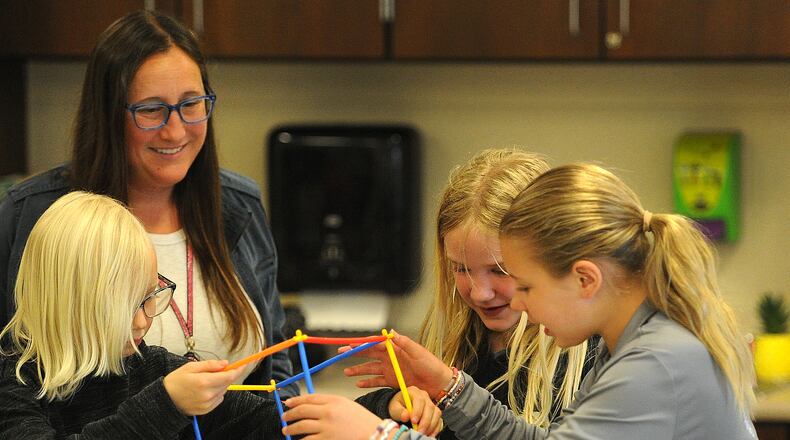Miamisburg’s STEAM (science, technology, engineering, art and math) special started as a technology class, said Jessica Lay, STEAM teacher for grades kindergarten through five at Miamisburg. It transitioned from a technology class to the STEAM class three years ago.
“These kids are just learning more and more about technology and adding in that engineering component where they’re designing, being creative and innovative to solve everyday problems,” Lay said.
“Special” classes are what elementaries call the group of music, art and physical education, or classes that aren’t every day.
The problems kids are solving in Lay’s class could be anything from designing a playground to finding a solution to the stray cats in the neighborhood. But it’s built on teamwork.
“That is what my class is,” Lay said. “How do we talk to each other if we disagree? How do we use our words?”
Teachers observed their students struggling with face-to-face interactions post-pandemic, when almost everyone learned online. The National Center for Education Statistics, part of the U.S. Department of Education, found 87% of public schools surveyed reported the pandemic negatively impacted student’s socio-emotional development during the 2021-2022 school year.
Additionally, 84% of public schools agreed or strongly agreed that students’ behavioral development has been negatively impacted.
I recently visited Lay’s classroom at Kinder Elementary and Hobbs’s fourth graders. Since it’s May, the students know the drill: they came in, separated into the eight tables in Lay’s classroom and listened to the challenge.
The students were given 20 minutes to design and build the tallest tower in the class. The groups of three were given $200 and a whiteboard. Then each group had the option to buy various items for the tower – Legos, magnets, straws, blocks and brain flakes, which are small plastic pieces shaped like a wheel. The tower had to stand on its own or it would be disqualified.
Each item cost $5, though the kids could get two brain flakes for $5. The fourth graders had to budget out the money, figure out the change, and work with Lay to get the pieces they wanted.
There were plenty of math skills to practice, like counting money and measuring the height of the tower.
There’s some science involved, because the tower had to be sturdy enough at the bottom to stand on its own but also tall enough to win.
There were teammate skills, because all the kids had to agree in the group on how they would build it. Lay required students to switch off who would pay for the items and who would get them out of the bins.
I was impressed. All the kids were engaged in the building process. I didn’t observe any groups where one kid was being left out while the others were working. It seemed like the kids naturally switched off who was buying materials. There were several groups who struggled to stabilize their tower, and while some of the kids got upset, they were still able to effectively communicate.
In addition to practicing their skills, these kids are learning how to learn, Lay said. She told them early on that there might be more failures than successes in the school year.
“But each one of those pillars is a learning experience,” Lay said.
Lay awarded a sticker or a piece of candy to the kids with the three tallest towers. The purple, red, and orange teams won after one team was disqualified because their tower didn’t stand on its own.
Lay also awarded the best teammates award to the forest green team. These were the kids she said were communicating well with each other and working to solve a problem.
“This was a fun class,” said Adam Weidner, one of the students in Hobb’s class, as they were lining up.
Lay said she applied for multiple grants when setting up the class and asked for donations of old Lincoln Logs and Legos from the community.
Teaching the class is a team effort, too. Two other teachers at Miamisburg, Gail Fex and Jennifer Christensen, teach the class too. Lay said she wouldn’t have been able to do the class without them on board. And the Kinder Elementary principal, Becca Huber, has been a supporter of the class.
“They have been a big pillar in all of this as well as the support from the principals and the administration,” Lay said.
About the Author




